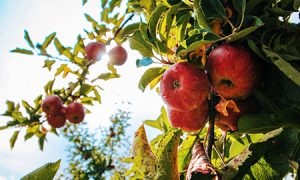
To paraphrase George Jones, master of the heart-rending Country ballad, it’s been a good year for the apples. There’s nothing heart-rending in that really, unless you regard it as a metaphor for abundant love gone to waste, which I suppose you could, and probably would if you were a Country singer. Or you’ve just spent the morning clearing up rotten apples from your back garden.
Don’t you find it reassuring, though, that back in the summer, when everything was brown and dead and sad and going all George Jones on us, those apple trees were keeping their powder dry and storing up their reserves, ready to spring back into life at the first drop of rain and produce a triumphant crop?
Three years ago I wrote one of these blogs on the word fig, during which I digressed slightly onto the subject of apples and my desire to get hold of a press. My friend Stuart responded by lending me his portable apple press and I was introduced to the joy of making apple juice. My happiness knew no bounds – so much so that my daughter, presumably thinking she’d discovered a miracle cure, bought me my own press for Christmas.
It’s one of those Christmas presents that you have to be really patient with, given that you don’t get to use it for nine months, but then we’re genetically predisposed to wait nine months, aren’t we, so it fits in perfectly with our natural biorhythms. (It doesn’t actually say that in the instructions; I just made it up.)
Anyway, it’s been out of its box a lot lately – as I think we all might be if my attempt to brew cider works out. While the juice of freshly squeezed apples is sumptuous and pure and refreshing and wholesome, there’s always that impish desire to let it ferment and see what happens. I’ve decided to go with a wild cider recipe, the ingredients of which are some apple juice, a bottle and a sachet or two of pure laziness (available online if you can’t be bothered to go to the shops).
Wild cider is basically apple juice that you forget about and hope it goes through the various self-purification stages and turns into something not too poisonous. It probably explains Norfolk. I drank some once in Oviedo, in northern Spain, whilst pursuing a love interest. The tradition is to drink it from a shared pint glass, which gets passed around. You take a sip and pass it on, the trick being not to swallow the bits and pieces at the bottom of the glass. If you do, you end up thinking you can speak Spanish and getting into arguments about Gibraltar. I did anyway.
The really exciting thing about wild cider is that there’s always the danger that it might blow up your fridge. You can always claim on insurance, though, and if it doesn’t, the reward is a deliciously crisp, dry beverage that will keep you refreshed and happy on a dry summer’s day.
You can tip the odds in your favour by adding a Camden tablet (aka sodium metabisulfite), which, not to be confused with most of the tablets on sale in Camden, simply gets rid of wild yeast and bacteria without making your brew taste like bleach. In fact, the tablet takes its name not from Camden Town but from the more salubrious Cotswold town of Chipping Camden, which in turn takes its name from an Old English word meaning market. It has nothing to do with potatoes or golf.
As well as its more famous role as home to the four century old Cotswold Olimpick Games – a testimony to the invigorating qualities of wild cider (sports include piano smashing, shin kicking and dwile flonking) – Chipping Camden was also home to the Fruit and Vegetable Preserving Research Station, an organisation that you really feel deserves greater recognition. As well as inventing the cider saving process, it probably helped win the war.
Today, reflecting the social change that’s taken place here in the last 100 years, the Fruit and Vegetable Preserving Research Station is now called the Brewing Industry Research Foundation, which I’ve just discovered is headquartered not three miles from where I live. I really should pay a visit before uncorking this first bottle but hey… as the man George said:
It’s finally Friday
Forget the workin’ blues
And let the good times roll
Might see you next week.


